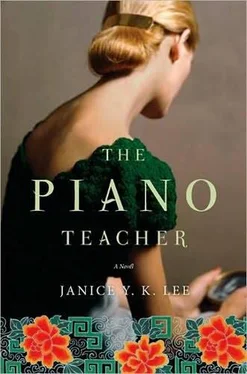He sits down. There is an exhalation of air, as everyone digests what he has said. And then hands pop up in the air. Schott stands up again to take questions.
“Do we have any idea how long we’re to stay here? ”
“None at all, unfortunately.”
“Are we allowed to have money? Or can we get money from the outside?” asks a Dutchman.
Schott laughs. He is very rich himself and has already acquired a great many comforts for the American faction, which have all been diligently and enviously noted by the other groups.
“I imagine you’re allowed to have whatever you want, if you can keep it a secret, or if you want to share it with them. I don’t know. This is one of those murky areas you don’t really want to get into officially. Just use your common sense.”
“Can we write letters to the outside? ” Hugh Trotter asks.
“I don’t think so. Or if we did, I think the people we wrote them to would never receive them or get such censored letters that they would be rendered useless-an exercise in futility, I suspect. I will certainly ask, but it seems unlikely. I’ll try to get Ohta, that’s the head of the camp, in a good mood, and ask him then.”
The questions fly fast and furious, mostly routine matters, prisoners worried about their daily comforts. Will starts to eat.
“What about me?” Ned says suddenly to the table. It’s the first time he’s spoken all day.
“What do you mean?”
“I’m registered as British, but there’s no British Ned Young. It’s going to be all messed up. No one at home is going to know I’m here. Where are all the Canadians? ”
“I think your compatriots are at the POW internment camp at Sham Shui Po. It is odd there are no other Canadian civilians, but perhaps they went home before all this erupted. I think you’re better off here than with the troops. And I’m sure Britain has enough Ned Youngs or Edward Youngs-it’s a common enough name-that they’ll take you in first, and then you can sort it out when you’re in. It will be asking for trouble to get you back with your colleagues.”
“No, no,” he says. “It’s all messed up. It’s all messed up now. I’ve done it for myself, haven’t I? No one knows I’m here. Nobody. My mum won’t know I’m alive or anything.”
“It’s all right. You’re here and you’re alive. That’s the important thing. Don’t worry too much about registration and things like that.”
“That’s easy for you to say,” the young Canadian snaps. “You’re all proper and accounted for. I’m alone here.” He stands up and walks out.
“He needs to have a moment,” Johnnie says. “Leave him alone. He’ll be all right.”
Will looks after Ned’s receding body. “It’s hard for him. I don’t think he’s eighteen yet. He’s here, halfway across the world, all by himself, with no hope.”
“Join the club,” Johnnie says. “It’s misery all around here at Camp Stanley. And it’s only the second day.”
After dinner, he and Johnnie go back to their room. On Will’s bed is a neatly wrapped package, with a note. It’s unsigned but it’s apparent that it’s from Ned.
“I wish you the best. Don’t worry and thank you for everything.” He has left the majority of his borrowed clothing.
“How on earth does he think he’s going to get out of here? ” Johnnie sits down on the bed.
“Lord knows. He didn’t want to incriminate himself or us, I suppose, with this rather cryptic note. I’m thinking the worst. He has no idea of the terrain out here, or even in town, no friends, no Chinese language, nothing. Even if he gets out of the camp boundaries, he’s a blind man. And he’s left all his clothes…” His voice trails off.
“Not the sign of a sane man, certainly,” Johnnie offers.
“No.” Will crumples up the note and puts it in his pocket.
In the morning, some internees are talking over breakfast about how they heard gunshots in the middle of the night, toward the southern wall of the camp.
February dawns the next week and it is cold. Hong Kong has a subtropical clime so there is no heating infrastructure and the winter is always an insidious, creeping cold that surprises you in the middle of the night or when outside too long. No sign of Trudy. It’s now been more than three weeks since he’s seen her. It’s getting to be more than disheartening-it’s embarrassing now as people inquire as to how she’s doing. Amahs, houseboys, local girlfriends, and spouses who are still on the outside for one reason or another come to try to see the internees, but the camp is still working out the visitation rules and they are turned away with their packages. Still, their visitors are allowed to leave word that they’ve been there.
Will concentrates instead on winterizing the buildings as much as he can. Beds have been provided, with some semblance of bed linens, but the temperature plummets at night. He’s never thought of the cold in Hong Kong as anything more than brisk, but he realizes now that that was with a proper winter coat and well-insulated walls. Everyone is hunched over, trying to conserve body heat, sleeping with all their clothes on, shivering in the bathrooms, not taking baths. When Will brushes his teeth, the silver water feels like ice. He puts in an official request for more blankets and winter coats, especially for the children, who are running around in their parents’ extra clothing, hems and sleeves trailing the floor. He organizes a patching team that goes around plugging any holes in the wall with a crude mix of mud and leaves. All this does little to alleviate the creeping misery of unrelenting discomfort that clouds their days.
Trudy, when she comes, is unexpected. A guard plucks Will from the lunch queue and takes him to the office of Ohta, the head of the camp.
Expecting a response to his blankets-and-coats request, Will is taken aback when he is told he has a visitor. They have not been allowed yet. But, of course, rules have never really applied to Trudy.
Ohta, a portly man with greasy skin and smudged wire spectacles, gestures that Will is to sit down. He is attired in a Japanese version of a safari suit, but one with long sleeves and pant legs.
“You have a visitor.”
“Is that so? ”
“We have not yet allowed any visitors.”
“I’m aware of that. But I don’t know anything about it.”
Ohta eyes Will over his desk.
“You want drink?”
“Please.” Will knows to accept.
He gestures to the soldier by the door and barks out something in Japanese. Whiskey is poured into small, dusty glasses.
“Kampai!” He lifts up his glass with one pink, porcine hand, and drains it, tossing his head back with a grunt. Will follows suit, with less vigor. Ohta shakes his head as if to throw off cobwebs. “Good!” He pours another.
“Your visitor, your wife?”
“I have no idea who my visitor is.”
“Woman, Chinese?”
“Trudy Liang?”
“Yes. Miss Liang is here to see you.”
“Oh, good.” Will’s heart is beating fast. “Thank you very much.”
“I told her only one time she can come on no visitors’ day. Special for her.”
“Well, she is special, isn’t she? ”
Ohta stares at him.
“No one special now. Everyone same, prisoner or not Japanese. Same!”
“Yes, of course.” Mercurial, he thinks. “Well, I think she’s special because she is to me.” Lame finish.
Ohta gets up. “Wait in room here.”
After a few minutes, during which Will sips at his whiskey, enjoying the warm burn in his throat, trying to calm his nerves, the guard gestures for him to come. They go into a small room with a table and five chairs, where Trudy is sitting, looking uncomfortable. She is thin, her clothes serviceable. Her hair is pulled back into a chignon, face colorless without any sort of makeup. Still, somehow, she radiates privilege.
Читать дальше












